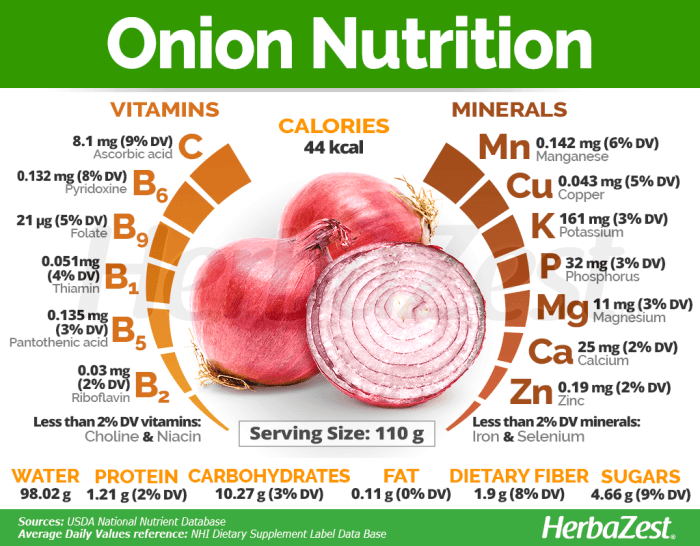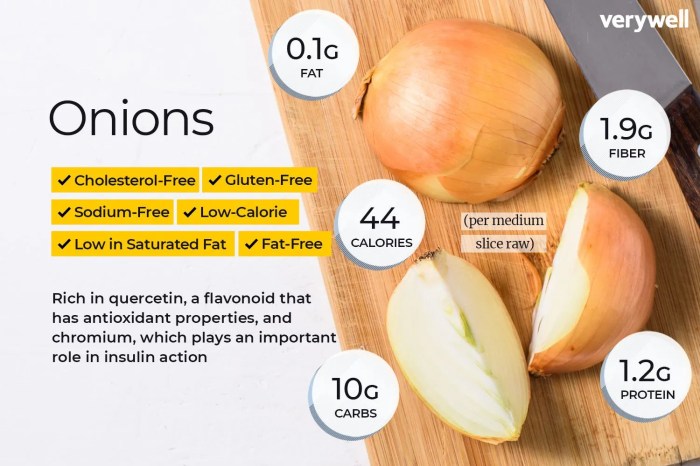Nutritional Profile of White Onions

White onion nutrition facts – White onions, a staple in many cuisines worldwide, offer more than just a pungent flavor; they’re a surprisingly good source of various vitamins, minerals, and dietary fiber. Understanding their nutritional profile can help us appreciate their role in a balanced diet. This section details the macronutrient and micronutrient composition of a typical serving of white onion.
White onions, a nutritional powerhouse, offer a good source of vitamin C and antioxidants. For a different kind of refreshment, you might compare these benefits to the nutritional profile of poppi soda nutrition facts , which often feature prebiotics. Ultimately, both contribute to overall well-being, though in vastly different ways, and both should be considered within a balanced diet.
Macronutrient Composition of White Onions
White onions are primarily composed of carbohydrates, with minimal amounts of protein and fat. The following table provides a breakdown of the macronutrients in approximately 100 grams (about one medium-sized onion):
| Nutrient | Amount (per 100g) | % Daily Value (approx.)* | Notes |
|---|---|---|---|
| Carbohydrates | 9.3g | ~3% | Primarily sugars and fiber |
| Protein | 1.1g | ~2% | Relatively low in protein |
| Fat | 0.1g | ~0% | Negligible fat content |
Daily Value percentages are approximate and can vary based on individual dietary needs and recommendations.
Vitamins and Minerals in White Onions and Their Health Benefits, White onion nutrition facts
White onions are a good source of several essential vitamins and minerals that contribute to overall health and well-being.
The following list highlights some key nutrients and their associated benefits:
- Vitamin C: A potent antioxidant that supports the immune system and protects cells from damage. A 100g serving of white onion provides a small but notable amount of Vitamin C.
- Vitamin B6 (Pyridoxine): Crucial for brain development, red blood cell formation, and the metabolism of proteins and carbohydrates. White onions contribute to the daily recommended intake of B6.
- Folate (Vitamin B9): Essential for cell growth and development, particularly important during pregnancy. White onions contain a moderate amount of folate.
- Potassium: An important electrolyte that helps regulate blood pressure and fluid balance. White onions are a decent source of potassium.
- Manganese: A mineral involved in bone health, wound healing, and metabolism. White onions provide a small amount of manganese.
- Quercetin: A flavonoid antioxidant with anti-inflammatory and anti-cancer properties. White onions are a rich source of quercetin, contributing to their potential health benefits.
Fiber Content and Digestive Health
White onions are a source of dietary fiber, primarily insoluble fiber. Insoluble fiber adds bulk to the stool, promoting regular bowel movements and preventing constipation. Adequate fiber intake is crucial for maintaining a healthy digestive system. The fiber in white onions also contributes to feelings of fullness, potentially aiding in weight management. While the exact fiber content can vary depending on the size and type of onion, a typical serving provides a moderate amount contributing to daily fiber requirements.
White Onions in a Balanced Diet

White onions, often overlooked in favor of their more visually striking red or yellow counterparts, offer a wealth of nutritional benefits and culinary versatility that make them a valuable addition to any balanced diet. Their pungent flavor, while strong, adds a depth and complexity to many dishes, and their nutritional profile supports overall health and well-being. Incorporating white onions into your meals is a simple yet effective way to boost your intake of essential vitamins and minerals.
Sample Meal Plan Incorporating White Onions
A balanced diet should include a variety of foods from all food groups. The following sample meal plan demonstrates how easily white onions can be integrated into daily meals, showcasing their versatility in different culinary preparations.
- Breakfast: Savory Oatmeal with Sautéed White Onions and Spinach. The sweetness of the onions complements the earthy spinach and hearty oats.
- Lunch: White Onion and Chickpea Salad Sandwich on Whole Wheat Bread. The sharp bite of raw white onion adds a nice contrast to the creamy chickpeas.
- Dinner: Roasted Chicken with Roasted White Onions and Potatoes. Roasting brings out the subtle sweetness of the onions, complementing the savory chicken and potatoes.
- Snack: Hummus with sliced white onion and whole-wheat pita bread. The raw onion adds a refreshing crunch and a slight tang to the creamy hummus.
Culinary Uses of White Onions
White onions possess a unique flavor profile that adapts well to various cooking methods, enhancing the taste of many dishes. Their sharpness is most pronounced when raw, but this mellows considerably with cooking, revealing sweeter notes.
- Raw: Excellent in salads, salsas, and as a garnish. The sharp, pungent flavor provides a refreshing contrast to other ingredients.
- Sautéed: The heat softens the onion’s texture and mellows its flavor, making it ideal for soups, stews, and stir-fries. Sautéing enhances the subtle sweetness.
- Roasted: Roasting intensifies the onion’s natural sweetness and creates a caramelized flavor, perfect for side dishes or as an addition to roasted meats.
- Pickled: Pickling preserves the onions and adds a tangy, spicy dimension, often used as a condiment or topping.
Comparison of White, Yellow, and Red Onions
While all onions share similar nutritional benefits, variations in flavor and nutrient content exist among different types. White onions generally possess a sharper, more pungent flavor when raw, compared to the milder sweetness of yellow onions and the slightly sweet and subtly spicy flavor of red onions.
| Onion Type | Flavor Profile (Raw) | Flavor Profile (Cooked) | Notable Nutritional Differences |
|---|---|---|---|
| White Onion | Sharp, Pungent | Sweet, Mild | Higher in quercetin (some studies suggest) |
| Yellow Onion | Mild, Slightly Sweet | Sweet, Caramelized | Similar nutrient profile to white onions |
| Red Onion | Sweet, Slightly Spicy | Sweet, Mildly Spicy | Higher in anthocyanins (contributes to red color) |
FAQ Guide: White Onion Nutrition Facts
Are white onions a good source of carbohydrates?
Yes, white onions contain carbohydrates, primarily in the form of simple sugars. However, the carbohydrate content is relatively low per serving.
Can I eat white onions raw?
Yes, white onions can be eaten raw, though some find them quite pungent. Raw consumption retains the most nutrients.
How do I store white onions to maintain freshness?
Store white onions in a cool, dark, and dry place, ideally in a well-ventilated container or mesh bag. Avoid refrigeration, which can cause them to spoil faster.
Are there any specific interactions between white onions and medications?
While generally safe, white onions may interact with certain blood-thinning medications. Consult your doctor if you have concerns.
What are the differences in taste between white, yellow, and red onions?
White onions have a sharper, more pungent flavor than yellow onions, which are milder. Red onions possess a sweeter, more subtle taste with a hint of sharpness.
 Interior Living
Interior Living
